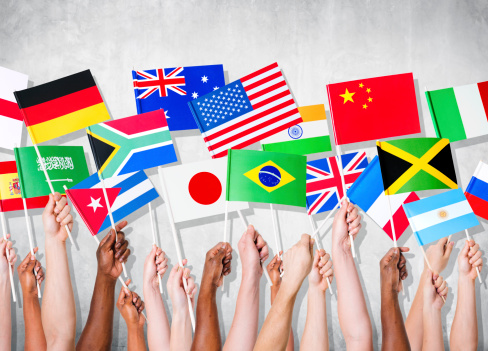We can’t fully understand how patriarchy works and how it can be dismantled—both inside the United States and out of it—without looking at trends in gender gaps worldwide.
On Tuesday, the Economist highlighted the release of the World Economic Forum’s 9th annual Global Gender Gap Index, which maps gender gaps on economic, education, health, and political criteria in 142 countries.
The index is simultaneously both unsurprising in certain respects (with, for instance, the top five slots all occupied by Nordic countries, renowned for their dual-carer welfare approach to gender equality) and revelatory in others (with Nicaragua, Rwanda, and the Philippines making it into the top 10, putting the United States, in 20th place, to shame).
The heatmap of the global findings below reveal how very far we have to go before we can declare that the fight against gender inequality is complete. Even Iceland, in the top slot, garners an overall score of just 0.859, with 1 equalling full equality, hindered like most other countries by low indicators in the Economic Participation and Opportunity category.
Mostly, however, this data series should be encouraging to gender-equality campaigners simply because it exists. Such hard data offers welcome empirical support for engaging with, for instance, the GamerGaters, men’s rights activists, and Women Against Feminism currently trolling Twitter, who often deny that gender inequality exists at all while actively attempting to obstruct gender progress around the globe.
A stylized example or two from my own Twitter timeline:
Man on Twitter: There’s no such thing as a gender pay gap. [Sends link to right-wing think tank document ‘debunking’ the 77-cent-per-hour pay inequality figure in the United States.]
Me: This is interesting given that pay inequality is a problem in every country in the world. [Sends link to a UN document on global pay gaps.]
Man: Well, that can’t be true, there is no pay inequality in the United States.
Me: Excellent, if you’re right now we can show other countries how equal men and women can be if they live in the richest country in the world.
Man: [Ends conversation.]
And another:
Woman on Twitter: Gender is not the right lens to analyze violence. Only mentally ill, irrational people engage in murder like Elliot Rodger. We should be talking about mental health instead.
Me: Actually violence is often a ‘rational’ response by men who feel their position is being threatened by women’s empowerment.
Woman: No, because the payoff for violence is almost nil in the modern world.
Me: What part of the ‘modern world’ do you mean? Where I live violence against women is a crucial method for upholding gender hierarchies.
Woman: Oh, I didn’t realize you live in Latin America.
Me: There are lots of men and women here, too.
Woman: [Ends conversation.]
Such blood-boiling exchanges are not only problematic because they reveal that many Americans have no interest in the lived experiences of men and women unless those people also live in rich countries (and, usually, are white). Such ethnocentric attitudes are not uncommon in our society, permeating issues ranging from gender inequality to global poverty reduction to the ebola outbreak. (The chauvinism of the U.S. media’s ebola coverage, for instance, was scathingly pointed out with this brilliant recent illustration by André Carrilho for World.Mic.)
But beyond American ethnocentrism more generally, it appears that the people most likely to make sweeping generalizations about men and women—and often, to do all they can to actively set back women’s rights at home and abroad—have universalized ideas about gender dynamics derived from a very small, very privileged context. Such people may be willing to concede that women suffer gender oppression in other places in the world, but argue that the U.S. has “arrived” and no longer needs to focus on gender issues at home. In doing so, they engage in a new form of othering while erasing gender realities in America itself.
Luckily, we now have resources like the WEF’s Global Gender Gap Index to quantify and give shape to these realities, pointing out both areas of high achievement and others that still need work in a comparative context. While the U.S. ranks 4th overall among the 142 countries for Economic Participation and Opportunity, it falls to number 65 for the “Wage equality for similar work” subcategory, and to 54 on the Political Empowerment dimension, with particularly dismal numbers for the “Women in Parliament” and “Years of female head of state” categories. (Yep, that last one brings our averages down quite a bit.)
Gender is a globally cross-cutting cleavage that requires anyone with a genuine interest in fighting oppression to scale up their perspective. We feminist activists must train our lens on the realities of women worldwide, viewing the U.S. as constituting part of global gender trends, not removed from them. Otherwise, we’ll simply build blind spots around our own vulnerabilities.
As cultural historian Rachel Holmes put it in a recent call-to-arms for international solidarity among women:
Men created themselves as a strategic, transnational class. Patriarchy is the most successful global movement, based on a coalition of many differences, in world history. And they don’t care a damn whether they are seen as “good,” “bad,” “aggressive,” “nasty,” “confrontational,” “war-mongering”—in fact, these are positive values amongst them. They bury their differences for as long as and in all the ways that enable them to maintain economic, cultural, and social preeminence. That’s why they’re still the top dogs the world over, and we’re either fluffy puppies or bitches. Feminism needs a new international, and a newly defined, program and strategy. You want to help organize?
Samantha Eyler is a freelance American writer, editor, and translator based in Medellín, Colombia. She has written about politics, immigration, Latin America, and social justice for publications such as NACLA and the New Statesman. You can follow her on Facebook and Twitter.
Related Links:

